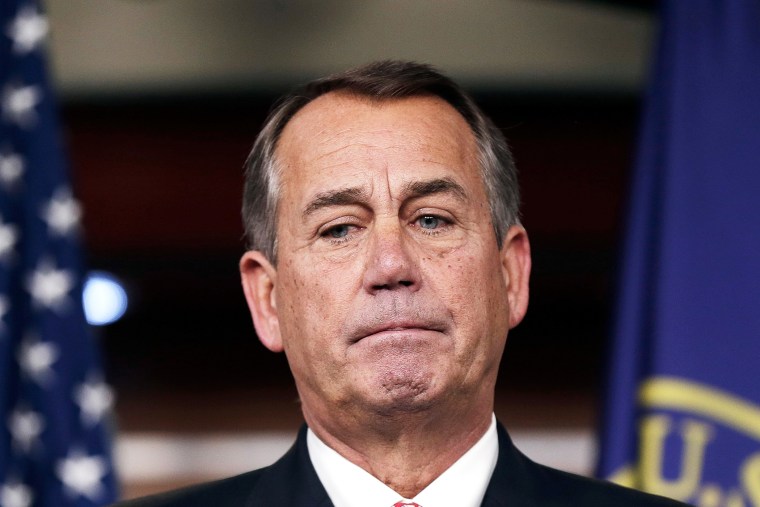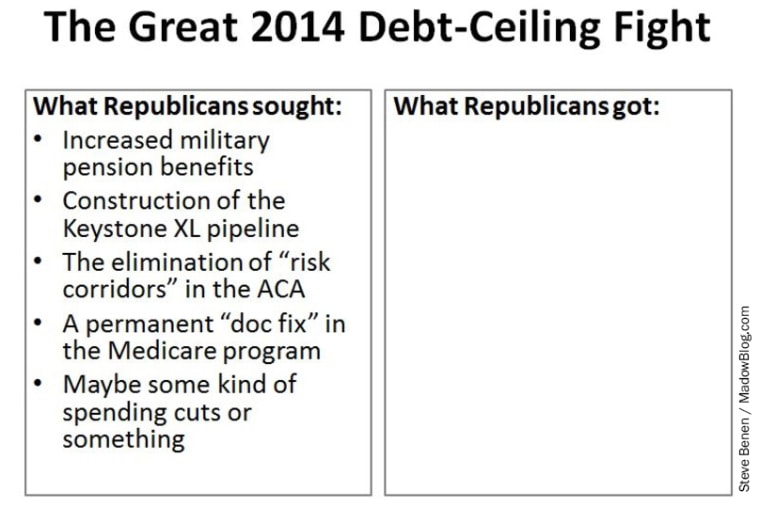
After the Speaker presented his plan to his own members, the GOP leadership team remained optimistic. "I believe we are on track," House Majority Leader Eric Cantor (R-Va.) boasted.
If by "on track," Cantor meant the entire plan was poised to collapse in a humiliating mess, then sure, the Majority Leader was exactly right.
Facing a rebellion over his latest debt ceiling proposal, Speaker John A. Boehner has told House Republicans that he will bring legislation to a vote on Wednesday that would raise the government's borrowing authority with no strings attached. "House Republican leaders told members this morning that it is clear the paid-for military COLA provision will not attract enough support, so we will be bringing up a 'clean' debt limit bill tomorrow," a Republican official said, referring to a plan on veterans' benefits. "Boehner made clear the G.O.P. would provide the requisite number of Republican votes for the measure but that Democrats will be expected to carry the vote."
There are 200 House Democrats, and it's generally expected nearly all of them will support Boehner's "clean" bill. If so, only 17 House Republican votes will be needed to pass the bill and end the fiasco. (Ordinarily, 218 votes are needed, but because there are currently three House vacancies, the majority threshold is slightly lower.)
GOP leaders will likely have to ignore the so-called "Hastert Rule" again, but since debt-ceiling increases are not optional, Boehner doesn't have much of a choice. Indeed, the Speaker himself said he'll cast a vote for the legislation.
And while that will bring a welcome resolution to the pointless dispute, it doesn't change the fact that Republicans made a huge strategic error picking this fight in the first place.
Remember, last spring, Republicans expressed a tepid willingness to start a debt-ceiling crisis. President Obama said he wouldn't negotiate on the full faith and credit of the United States; GOP members backed down; and Congress passed a clean debt-ceiling increase.
Then in the fall, Republicans again said they were ready to hold the debt ceiling hostage. Obama again refused to play along; Republicans backed down again; and Congress once more passed a clean debt-ceiling increase.
Which strategic genius in the GOP woke up one morning in January thinking, "I know, let's try the same dumb idea again and hope for a different result"?
The question isn't why House Republicans failed; the question is why they picked this fight knowing in advance failure was inevitable.
Not to put too fine a point on this, but it's generally the job of the Speaker of the House to steer clear of legislative icebergs. Boehner has a responsibility to see the challenges ahead and lead his chamber towards a responsible course. If he had the influence and leadership skills generally associated with House Speakers, Boehner never would have allowed this misguided hostage gambit to begin in the first place.
But the Speaker allowed it to unfold anyway, and both he and his party ended up with nothing to show for it except another round of public humiliation.
As for the larger precedent, much of the Beltway suffers from poor memories, but I hope folks will remember this moment well -- debt-ceiling crises are a thing of the past.
UPDATE: Related video:
